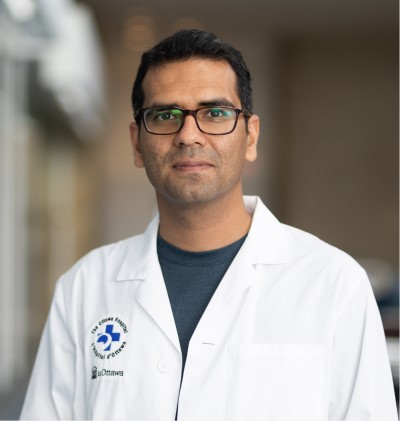 “I was always fascinated by nature, and cancer biology was a field where I could use that fascination to help people. We can use tools from nature to study cancer.” -Dr. Taha AzadAs a child watching fireflies in northern Iran, Dr. Taha Azad never dreamed he would someday use the secret behind their glow to help fight cancer and a global pandemic.
“I was always fascinated by nature, and cancer biology was a field where I could use that fascination to help people. We can use tools from nature to study cancer.” -Dr. Taha AzadAs a child watching fireflies in northern Iran, Dr. Taha Azad never dreamed he would someday use the secret behind their glow to help fight cancer and a global pandemic.
During weekend walks in the mountains, Dr. Azad would ask his father many questions about the natural world. This curiosity led him to do an undergraduate and master’s degree in biology at Tehran university, studying luciferase, the protein that makes fireflies glow.
For his PhD at Queen’s University in Kingston, Dr. Azad harnessed that glowing protein to study cancer.
“I was always fascinated by nature, and cancer biology was a field where I could use that fascination to help people,” he says. “We can use tools from nature to study cancer.”
From cancer to COVID-19
Using luciferase, Dr. Azad created a biosensor that helps researchers find cancer-causing genes in minutes instead of months. Biosensors are tools that answer biological questions very quickly, like a pregnancy test. Dr. Azad’s biosensor works by breaking luciferase into pieces and sticking them on the proteins he’s interested in. When those proteins interact, they glow.
In 2019 Dr. Azad joined Dr. John Bell’s lab at The Ottawa Hospital to explore how his biosensors could help create better cancer-killing viruses. “I found a few proteins in cancer cells that could be engineered into specific viruses in order to better target cancer cells and reduce damage to healthy tissues,” he explains.
However, biosensors weren’t just good for studying cancer. When the pandemic hit, Dr. Azad and the other virus experts in his lab turned their sights on COVID-19.
“As researchers it was our responsibility to help however we could,” said Dr. Azad. “Whether it’s cancer biology or infectious disease biology, there are always proteins interacting that we can look at with biosensors.”
For COVID-19, the interaction everyone wanted to know about was the virus binding to the ACE2 receptor in human cells, which is the first step in infection. In January 2020, Dr. Azad’s wife, biochemistry and molecular biology researcher Mina Azad, suggested he develop biosensors for COVID-19. Together, Dr. Azad and his colleagues worked long hours to make this idea a reality. Finally, they had a biosensor that could reveal this interaction in just a few minutes.
Global teamwork to solve global problems
“When we published the first paper describing our COVID-19 biosensor, people around the world started contacting us,” he remembers. “There were researchers who wanted to develop new drugs that targeted this interaction. We had a biosensor, they had the knowledge, so we shared it. Because that’s how we will solve big problems– by working together.”
Dr. Azad also collaborated with Dr. Jean Simon Diallo’s group at The Ottawa Hospital, using the COVID-19 biosensor to test hundreds of existing drugs and finding a few that work against variants of concern.
This brilliant researcher also loves teaching. During his bachelor and master’s degrees in Iran Dr. Azad flew to a different city every weekend to teach high school biology, helping make up the shortage of specialized teachers caused by the fast-growing student population. Dr. Azad’s dream job is a faculty position with his own lab where he can both teach and do research.
To relax, Dr. Azad loves playing with his sons and hiking with his family.
“Coming to The Ottawa Hospital to do research is one of the best decisions I’ve made,” he says. “It’s one of the best work environments I’ve ever seen because there are patients, researchers and clinicians all working together on the big dream of helping patients with cancer.”
Check out this Q&A to learn more about Dr. Azad and what inspires him.
The Ottawa Hospital is a leading academic health, research and learning hospital proudly affiliated with the University of Ottawa and supported by The Ottawa Hospital Foundation.
